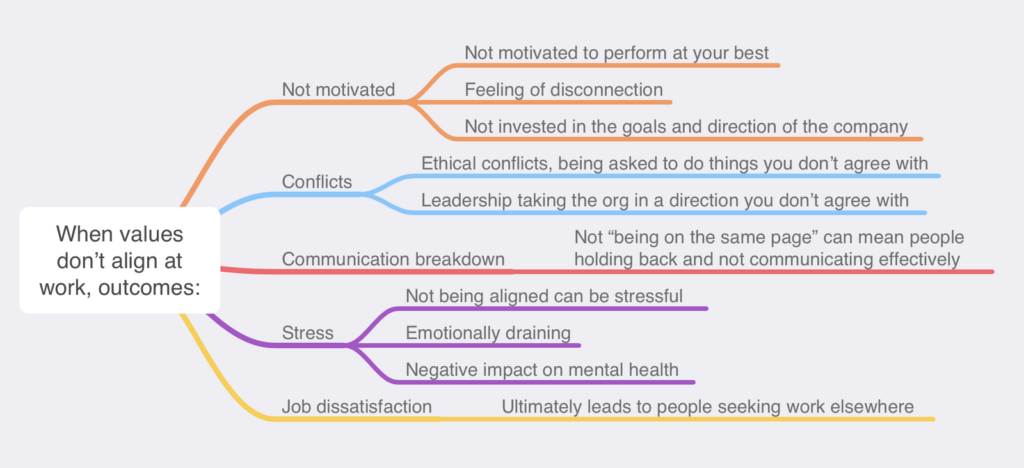When embarking on a career transition or considering what career to pursue, I believe assessing your values and strengths is the first foundational step.
In this article, I’ll outline the power clarity over your values can deliver for your choices – potentially making or breaking a career. In a follow-up article, I’ll cover how to discover your values.
What are personal values?
You might only know one of your values once someone crosses it! Personal values are beliefs or principles that are important to you. Your upbringing, culture, and life experiences shape them. Values shape your behaviour, decision-making, and direction and will influence whether you enjoy working in a particular career or company.
For me, independence has always been a big driver. Above many others things such as salary. I’m not saying this is better or worse than anyone else’s values. I enjoy autonomy.
Other values include loyalty, the ability to be creative, integrity or doing the right thing by people, community, family, financial independence, etc. It might not be at the front of your mind when making a career decision, but it ought to be – since alignment with your values determines whether you will live a fulfilling life authentic to your beliefs.
How do values compare with strengths and skills?
In contrast to values, the beliefs or principles you live by, strengths refer to the specific abilities or talent someone might have.
The difference between these two concepts is why traditional career coaching fails (Or at least the career advice I received when I was younger). Traditional career coaching is focussed on strengths – “Oh, I see that you are good at maths; have you thought about being an accountant?”.
Skills, conversely, relate to things we’ve learnt through education, training and hands-on experience.
Picking a career based on your strengths is good; choosing a direction based on your skills and experience is also good, but the ultimate is if your choices align with your values and something you would stand up and fight for.
How personal values develop
A wide range of life experiences can influence personal values, but some experiences may have a more significant impact. Here are some examples:
- Family upbringing: The values instilled in us during childhood and adolescence by our families can profoundly impact our values. Our parents, siblings, and extended family members can all play a role in shaping our values.
- Education: Our experiences in school and higher education can also impact our values. For example, exposure to new ideas, cultural diversity, and social issues can all influence our values.
- Career and work experiences: The values of the organisations we work for and the people we work with can impact our values. We may be influenced by the values of our colleagues, bosses, and workplace culture.
- Travel and cultural experiences: Traveling to new places and experiencing different cultures can broaden our perspective and expose us to new ideas and values.
- Personal relationships: Our personal relationships, including romantic relationships, friendships, and mentorships, can influence our personal values. The values of the people may influence us we spend time with, or we may develop new values due to these relationships.
- Traumatic experiences: Traumatic experiences such as illness, loss, or accidents can also impact our personal values. These experiences can make us re-evaluate our priorities and what is truly important in life. Particularly relevant for COVID and the great resignation, a significant cultural shock to the way of life plus a pause for thought about what’s important in life led to many reevaluating their work-life and making changes.
When values don’t align at work
Values not aligning in the workplace may lead to job dissatisfaction, conflict, a breakdown in communication, stress, and, ultimately, people leaving.

Naturally, the opposite is true when you work somewhere where your personal values match or align with the company. People will experience higher job satisfaction, are more likely to be motivated, “click” with the shared culture of the organisation, will communicate better with people with similar values, and so on.
How to assess the values of a company
Before joining a company, it’s essential to understand its values to ensure that your personal beliefs and work ethics align with the company’s culture. Here are some ways to identify the values of a company:
- Company website: Visit the company website to learn about its mission, vision, and values. The website can give you a good overview of what the company stands for and what they prioritise.
- Social media: Follow the company’s social media accounts to understand its corporate culture and values. Companies often use social media platforms to showcase their culture, values, and initiatives.
- Employee reviews: Look up reviews of the company on sites like Glassdoor, where current and former employees can share their experiences. Reviews can give you insight into the company culture and how well it aligns with your values.
- Networking: Talk to people in your professional network who have worked at the company or who have connections with the company. Ask them about their experiences and what they know about the company’s culture and values.
- Interviews: During the interview process, ask questions about the company’s culture and values. Ask about the company’s mission and how they prioritise its values. This approach can give you a better understanding of the company and whether it aligns with your personal beliefs and work ethic.
By considering these factors, you can get a good sense of a company’s values before joining them.
However, I would also say that you don’t work for the company but for your manager. And the values of your immediate manager might be enough to cause conflict.
This article has quickly reviewed personal values and how they might make or break a career. In the following article, I’ll explore how to discover your values.
Image Credit: https://openai.com/product/dall-e-2


One comment for “How clarity over values can make or break your career”
17 questions that unlock your personal values
[…] previous article discussed how values could make or break your career. In this follow-up article, I will cover identifying your […]